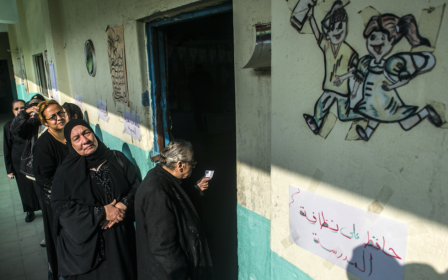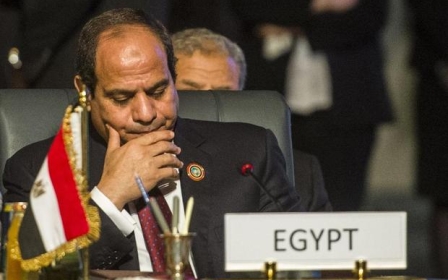Egypt parliament desperately seeks speaker as first session looms

Egypt's parliament has been left scrambling to find a speaker after the head of Egypt's Supreme Constitutional Court and ex-interim president Adly Mansour turned down a request by President Abdel-Fattah el-Sisi to join the body.
Mansour said on Tuesday that he would prefer to maintain his position at the top of Egypt’s highest court, according to al-Ahram newspaper.
His refusal leaves the newly elected parliament in a bind ahead of its inaugural session on 10 January, when several high-profile MPs are known to have supported the idea of electing him as speaker.
Representative of Cairo's Hadayek el-Qubba district, Sayed Farag, said a large number of MPs had urged Sisi on Monday to appoint Mansour to the coming parliament so that he could be elected as the speaker of parliament, according to al-Ahram.
The president directly appoints five percent of MPs in the parliament. Sisi is expected to announce his list of appointees in a few days, or before parliament holds its procedural sitting in two weeks.
"In this message, we informed Sisi that a lot of MPs believe that Mansour has the constitutional and legislative experience necessary to be the speaker of Egypt's new parliament and that there is wide support for this request among MPs," said Farag.
Sources quoted in al-Ahram said that Sisi had held two meetings with Mansour on Saturday and Monday to discuss his appointment, and his possible elected as speaker.
"In these two meetings, Sisi exerted pressure on Mansour to accept appointment in parliament, in addition to seeking his opinion about what other names should be appointed," a source told al-Ahram newspaper
Mansour served for 11 months as interim president after the country’s first democratically elected president, Mohamed Morsi, who hails from the Muslim Brotherhood, was removed in a coup in July 2013.
Mansour has since come to be known as a "man of the law" and was the first Egyptian head of state to leave office peacefully when he handed power to Sisi in June 2014.
Sameh Seif al-Yazal, a the head of the Egyptian State Coalition in parliament and a close Sisi ally told al-Ahram that there was no clear alternative as speaker.
"After reviewing the list of figures who announced they would run for the post , MPs agreed that they all lack support and that a high-calibre figure like Mansour is highly needed for this position," said Yazal.
Other contenders
Justice Minister Ahmed el-Zind and former foreign minister Amr Moussa are now being touted as possible frontrunners. However, commentators say they do not enjoy much support among MPs.
Two high-profile journalists, TV host Tawfik Okasha and columnist Mostafa Bakri, who belongs to the pro-Sisi For the Love of Egypt coalition which won the largest number of seats, are also said to be in the running, as are Osama el-Abd a former president of Al-Azhar University and Ali Abdelaal, a constitutional law professor.
All the men have already been elected to Egypt’s lower house, but again it is not clear if any of them would be able to gather enough support.
The most controversial of those names is Okasha. Last week, Egypt's Minister of Parliamentary Affairs Magdi el-Agati and Ahmed Saadeddin, the parliamentary secretary-general, denied him permission to hold a news conference announcing the formation of a new parliamentary bloc, the Coalition of Independent MPs, Egyptian newspapers reported.
On Monday, Okasha was banned by a national monitoring board from appearing on any television channel for six months for committing “violations against media freedoms".
The ban came after he announced that he would resign from parliament and seek political asylum in Germany. He claimed that Egypt’s security apparatus have been harassing him, the online news website Egyptian Streets reported this week.
Voting on Egyptian law
Whoever is chosen as the speaker will be required to tackle a number of key issues.
According to Article 156 of the Egyptian Constitution, the new parliament will have to pass all laws ratified since 2013 within 15 days of its first assembly, meaning that the speaker will have to hold a vote on more than 400 laws passed by Sisi and Mansour.
Analysts and law specialists have been divided over the meaning of the article, with some saying it only refers to decrees passed on urgent matters while parliament was not in session, such as the new anti-terrorism law, reported al-Ahram.
Others, however, believe the article refers to all laws passed since former president Morsi was removed, saying all 400 laws should be put to a vote in 15 days.
The Supreme Constitutional Court is to give a binding opinion on how Article 156 should be implemented next Tuesday.
"This is important ahead of parliament's procedural sitting... in order for MPs not to face disastrous surprises on that day," al-Ahram reported MP Anwar al-Sadat as saying.
Egypt's parliament was previously made up of a lower house, the People's Assembly and an upper house, the Shura Council, but this was cancelled in 2014 to give way to a single House of Representatives.
The body has 448 elected MPs, 120 party-based list MPs, and 28 presidential appointments.
With many political opposition parties, including the Muslim Brotherhood, now banned in Egypt and various high-profile leftists also in jail, most of those allowed to stand for elections are seen to be pro-Sisi, with no real opposition to his presidency emerging.
Middle East Eye propose une couverture et une analyse indépendantes et incomparables du Moyen-Orient, de l’Afrique du Nord et d’autres régions du monde. Pour en savoir plus sur la reprise de ce contenu et les frais qui s’appliquent, veuillez remplir ce formulaire [en anglais]. Pour en savoir plus sur MEE, cliquez ici [en anglais].




